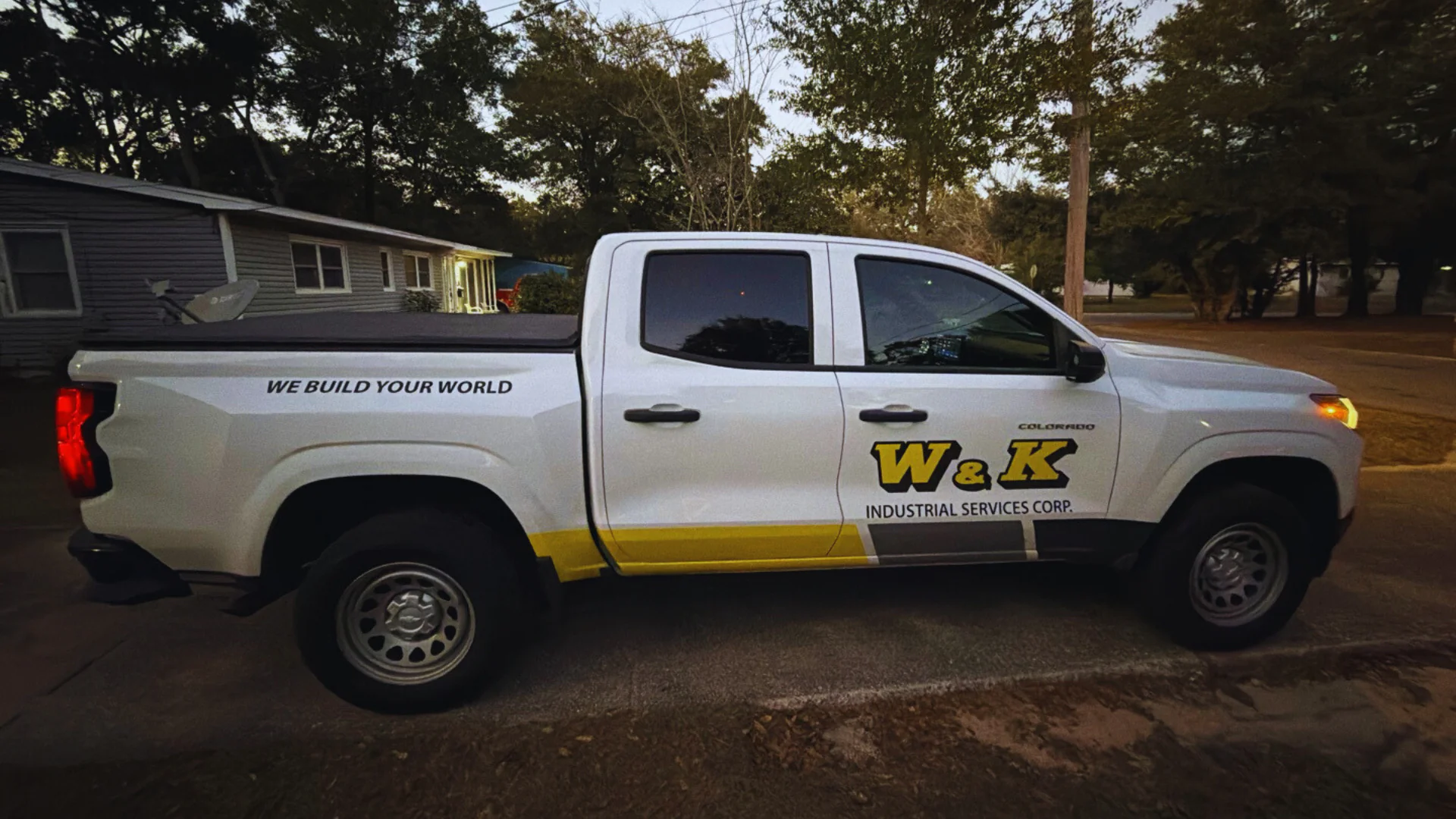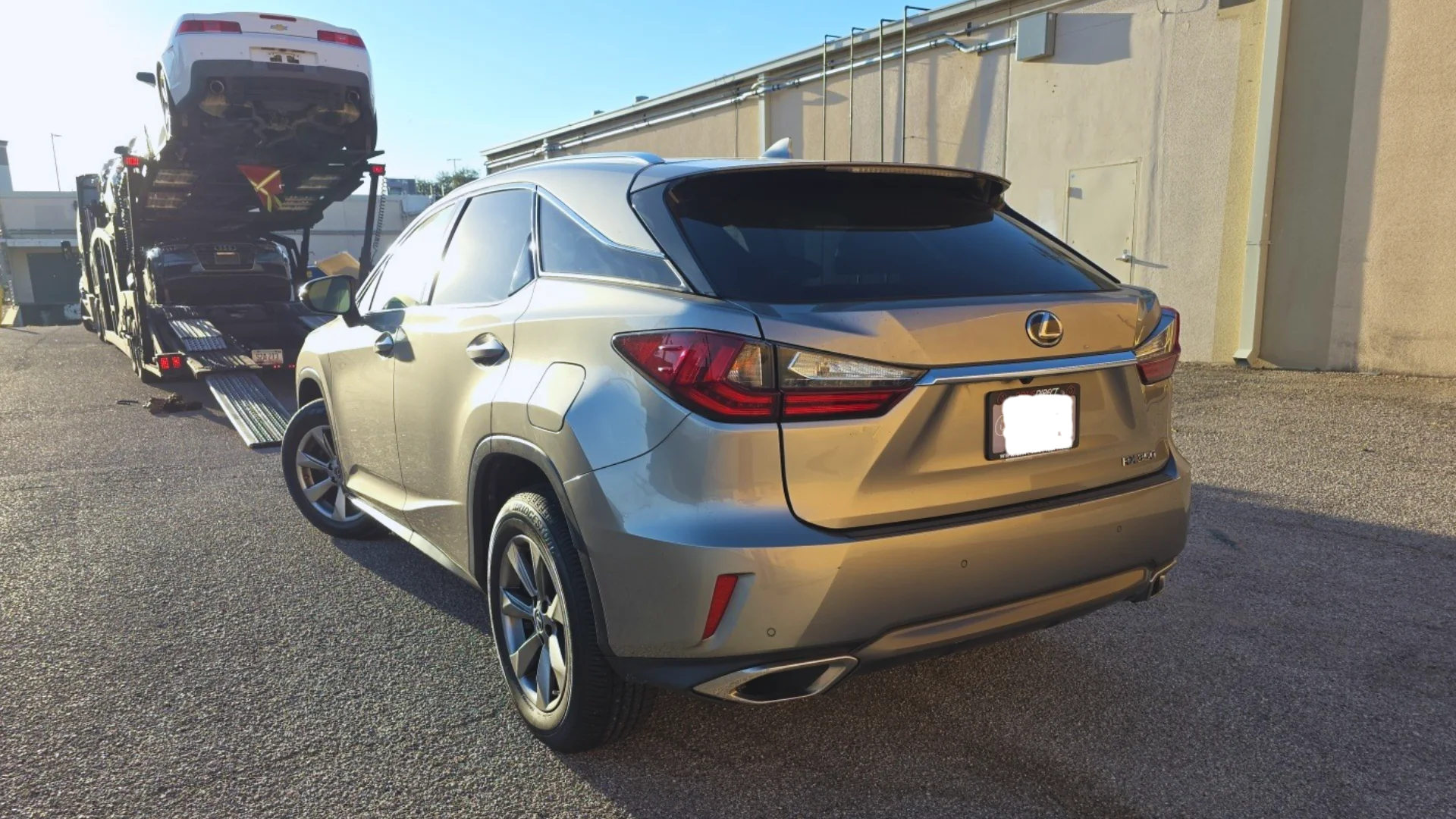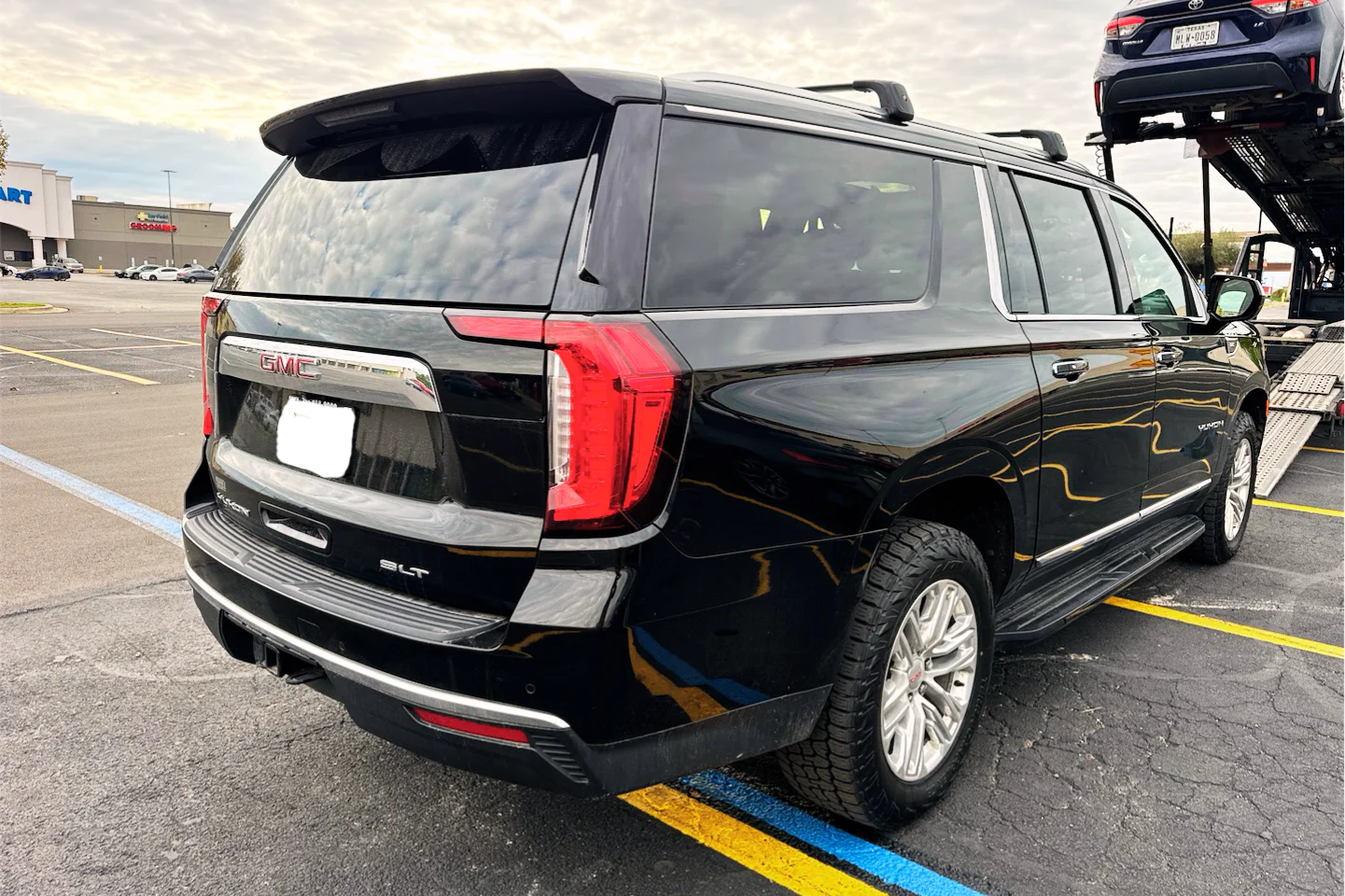How Open Transport Delivered a Luxury Mercedes Safely: Car Shipping from Huntington Beach, CA to Hull, MA
An example of a coast-to-coast car transport of 2023 Mercedes S-Class vehicles from Huntington Beach, California, to Hull, Massachusetts. This one demonstrates the risks and elements associated with the “guaranteed pickup” service within a short time frame, such as 48 hours, during the busiest time of the year, which is the last week of December. The open transport service, instead of the enclosed transport, saved almost $1,000 while still allowing the transport of the luxury vehicle within the short time frame of nine days over 3,015 miles.
The Guaranteed Pickup Nobody Saw Coming
Most people don’t know what “guaranteed pickup” means. This isn’t some fancy jargon we use for marketing.
We are talking about standard transport here. If you book standard transport, we will find a carrier if one is available. It could take three days. It could take one week. The driver collects your car when he passes by your area.
Guaranteed pickup is different. Guaranteed pickup is when we guarantee a certain date. The carrier is committed to guaranteed pickup, regardless of circumstance. Missing it means you won’t be billed.
This customer placed their booking on the 6th for pick-up on the 8th. This is close. So close it hurts. To find a carrier who has room on their trailer, who is already scheduled on a cross-country run, and whom they can reach within 48 hours, at Huntington Beach? This is work. However, the price for guaranteed service is higher for a reason. We were tasked with making it happen. A carrier was assigned on the 8th of December, and it was picked up on the same day.
Why Open Transport Made Sense Here
Here’s what car dealerships don’t want you to know. Enclosed transportation is excellent, but not always required.
The 2023 S-Class starts at about $115,000. Most car enthusiasts hear that price tag and immediately lock their minds onto the idea of an enclosed trailer. It just sounds safer, you know? Weather protection. Privacy. All the high-end amenities.
Yet how about the process of getting there? The car is shipped on a trailer. It travels across the country on the highways. That’s all.
Open trailers will expose your vehicle to the same elements that you would experience driving through. Rain, dust, maybe some snow. Nothing that your car wasn’t designed to deal with.
This carrier in particular operated a 9-car hauler. A professional outfit that operates cross-country routes every week. They loaded the Mercedes onto the top deck. This is important because road debris kicks up from underneath, so it is better if it is on top. The customer was saving approximately $900 to $1,000 more with the open than the enclosed option. The S-Class was delivered in pristine condition. Not all practical decisions are wise choices.
Three Thousand Miles in December

Huntington Beach is literally right on the Pacific in Orange County. Hull is an intrusion into Boston Harbor, just south of the city of Boston. You can’t possibly get more coast-to-coast than these.
The route likely continued I-15 North into Nevada, then I-70 or I-80 East, depending on the weather. It’s hard to predict in December. Colorado can sneak up on you unexpectedly. Wyoming has blizzard conditions that can close whole interstates for days.
Little Rock usually proceeds more quickly. Kansas, Missouri, Illinois, and Indiana follow. Holes in traffic are big enough to enable good time to be made unless a high-volume route comes through. Averages may run 300 to 350 per day in good weather on the long hauls.
Then you get to the eastern states. Ohio, Pennsylvania, and then New York. By the time you get to Massachusetts, you’re running on empty and coffee from truck stops. It took this carrier nine days. Pickup date is December 8th. Delivery date is December 17th. Now, this is not bad at all, given that it is winter.
The Part About Risk Nobody Wants to Discuss

Shipping a brand-new S-Class on an open trailer makes some people nervous. The car costs more than most people’s annual salary.
The risk of damage doesn’t change all that much between open and enclosed transport. What does change is the exposure to weather and road conditions.
If the carrier knows what they are doing, then it doesn’t matter what kind of trailer it is; they secure the car properly. Soft straps. Proper weight distribution. Soft loading and unloading.
The biggest risk on open trailers is road salt in winter. Northeastern states dump tons of it on highways during December. If you leave it sitting there, it eats paint and metal. The S-Class came back clean. No damage. No issues. The customer saved a thousand bucks and got the same result that they would’ve gotten with enclosed.
What This Customer Got Right
It’s that guaranteed pickup which has enabled this whole thing to have happened. Without the commitment, there would have been just no way of finding a carrier in December within 48 hours.
Most customers should book a week or two in advance. That gives the carriers time to route and load accordingly. A guaranteed option does exist for situations like this where timing means everything.
It helped that he was flexible on the type of trailer. A lot of owners of expensive cars default to enclosed without considering it. He actually assessed the risks and knew an open transport would be good. Communication sealed the deal. The customer stayed available during the booking process. When everyone stays in touch, problems get solved before they become actual problems.
Transport Summary
Vehicle: 2023 Mercedes-Benz S-Class
Route: Huntington Beach, CA 90254 to Hull, MA 02045
Distance: 3,015 miles (coast-to-coast)
Primary Routes: I-15 N through Nevada, I-80 E through Wyoming, Nebraska, Iowa, Illinois, Indiana, Ohio, Pennsylvania, New York, to Massachusetts
Service: Open-air multi-car carrier (9-car hauler, top deck)
Cost: $1620 ($0.53 per mile)
Transit Time: 9 days (December 8 pickup – December 17 delivery)
Season: Winter
2025 Chevy Colorado Truck Shipping from Pensacola, FL to Moore, SC
A customer recently booked vehicle transport through our AI-powered price calculator. They needed to move a 2025 Chevrolet Colorado from Pensacola, Florida to Moore, South Carolina. The system calculated real-time market rates based on current carrier availability and route demand. Within hours of booking, we matched the shipment with an experienced carrier specializing in full-size truck transport.
Moving a brand-new Colorado requires careful planning. These trucks sit higher than standard sedans and weigh more than compact vehicles. The carrier assigned to this shipment had over eight years of experience hauling pickups and SUVs across southeastern corridors. Our residential pickup service meant the customer didn’t need to drive anywhere. The carrier arrived at the specified address in Pensacola ready to load.
The Heritage Of American Truck Manufacturing
The Chevrolet Colorado symbolizes years of truck design specialization by American automakers. General Motors has built this mid-sized truck so that it can serve as a daily vehicle for commuting as well as for weekend outings. The latest version of Chevrolet Colorado, which is expected in 2025, has enhanced safety features and improved towing capabilities.
Such trucks aren’t delicate vehicles. They’re made to withstand construction site environments, camping, and other similar purposes. However, this doesn’t mean trucking companies can handle them casually. New trucks should be treated in the same manner as other vehicles when they are shipped. Paint can be scratched. Mirrors may be broken. Components on the undercarriage may be damaged by improper loading.
The ground clearance of the Colorado measures around 8.5 inches depending on the model variant. This ground clearance will work quite well with most standard auto transports. There will be no need for low-angle trailers as used for sports cars. The truck mounted the trailer without any scratching issues.
The 2-Car Hauler Method: Strategic Approaches for Large Trucks
Trucks are quite voluminous and occupy larger spaces on the transport carriers. A conventional multi-car carrier will carry up to ten vehicles at a time. However, if some of the carriers are filled with trucks, the carrier will accommodate no more than six or seven vehicles at a time. This will affect the pricing because there will be reduced revenue for the carrier.
However, our carrier utilized a 2-car hauler for this particular shipment. Smaller trailers provide a degree of flexibility that larger haulers cannot provide for a company that transports as many vehicles as this carrier does on a daily basis. They can easily traverse residential roads that larger haulers would find extremely challenging. Additionally, they provide parking space that larger haulers could not accommodate. Furthermore, they offer rapid delivery services.
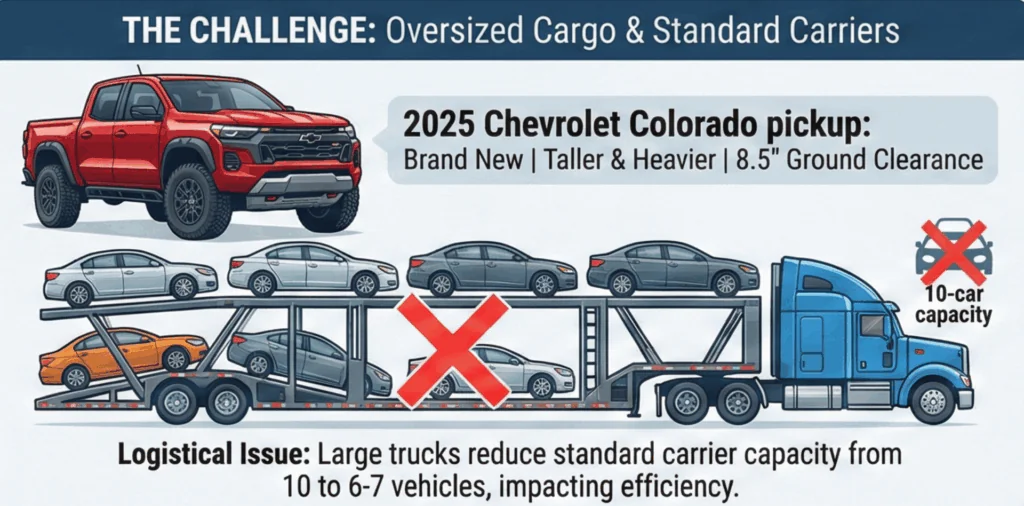
The 2-car trailer also makes loading and unloading much simpler. There are simply fewer vehicles being loaded or unloaded from the trailer. There were only two vehicles being shipped in this case. This increases the speed of pickup and delivery. The transport company does not have to make several stops along the route in order to deliver its freight. Two-car haulers will often employ an open transport configuration. These vehicles will sit exposed to the conditions of transportation. In the case of a completely new truck such as the Colorado, this method of transport proves to be acceptable.
The paint and clearcoat finish of this truck are durable enough for highway driving and do not require the extra protection of an enclosed transport method to keep it looking its best upon delivery to the buyer.
A 550-Mile Journey From Pensacola, Florida, To Moore, South Carolina
This ride goes to the northeast for approximately 550 miles. Usually, it would take a carrier one to two days to complete this journey in good weather. Starting in the morning from Pensacola,, the Colorado had reached Moore and was ready to be delivered.
Along the way, I-10 moves traffic east out of Pensacola through Mobile and into southern Alabama. The route then heads north toward Montgomery, cuts through Georgia, and slips into South Carolina. Road conditions along this corridor stay fairly consistent year-round. Southern routes like this aren’t as prone to winter weather disruptions as northern paths.
Carrier teams can track progress along the route. In our customer’s case, he received notice when the truck left Pensacola and when it crossed into South Carolina. That kind of transparency seems to help alleviate concerns, as in letting people know the vehicle is moving and on schedule.
Federal rules on hours of service limit how much driving may occur in one day. After taking a 10-hour break, drivers can operate their vehicles for 11 hours. Day one, then, saw approximately 450 miles covered before night began to fall; the remaining miles were to be handled the next day. These are the rules designed to prevent fatigue and increase safety for all concerned on the highways.
Damage-Free Delivery: A Commitment to Protect Your Vehicle
Protection begins before the first strap is secured. In Pensacola, the carrier gave the vehicle a meticulous pre-load inspection, noting its condition with photos and notations on the Bill of Lading. This baseline paper trail is key-if damage happens, it conveys where it occurred.
Four tie-down straps secured the Colorado for the trip. The straps attach to the frame and wheels to keep the vehicle from shifting. Too loose, the car can move; too tight, you risk stressing suspension components. Seasoned carriers know the exact tension needed.
Rocks, dust, and road debris are the ever-present hazards of transit. Open transport exposes a vehicle to the elements, though major interstates typically see less debris than rural routes. The Colorado did pick up some dust on the way, but a quick wash after delivery brought it back to showroom shine.
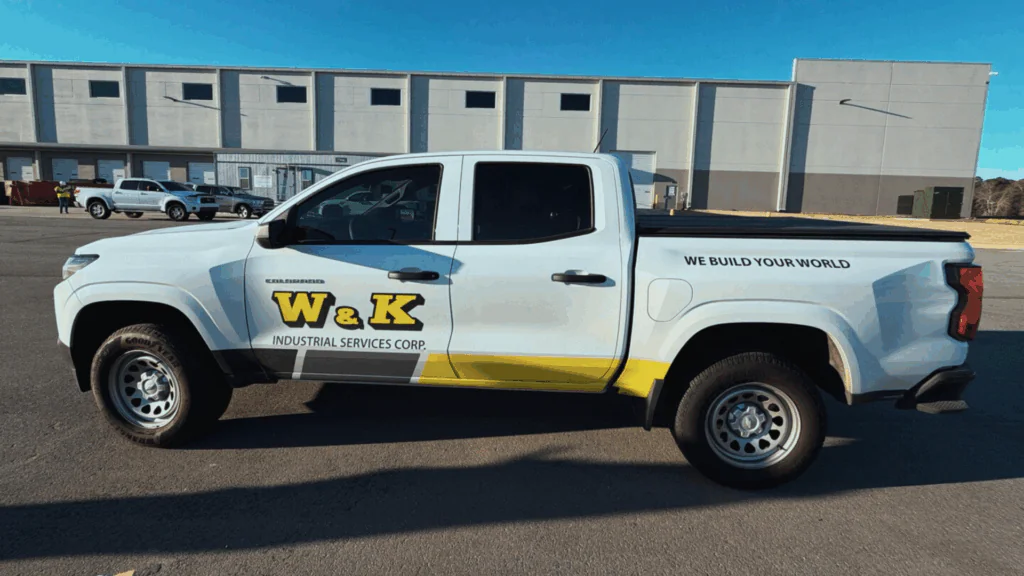
Post-Delivery Verification: Ensuring Complete Customer Satisfaction
Stress-free delivery depends on thorough final inspection. When the carrier arrived in Moore, they unloaded the Chevy Colorado and walked around the vehicle with our customer. They compared the truck’s current condition to the pre-transport photos taken in Pensacola. Every panel, mirror, and tire got checked.
The customer signed the Bill of Lading confirming satisfactory delivery. This signature closes the transport contract. If any damage had appeared, the customer would have noted it on the BOL before signing. Insurance claims require this documentation. Without noting damage at delivery, proving it occurred during transport becomes nearly impossible.
The entire process from booking to delivery took less than three days. Our AI-powered pricing system provided transparent costs upfront. No hidden fees appeared at delivery. The quoted price matched the final price. This predictability matters to customers planning vehicle transport.
Moving a 2025 Chevrolet Colorado from Florida to South Carolina demonstrates how professional auto transport handles modern trucks. The right equipment and experienced carriers make the difference between successful delivery and damaged vehicles.
Shipping Summary
Vehicle: 2025 Chevrolet Colorado
Route: Pensacola, Florida to Moore, South Carolina (500 mile)
Pensacola, FL → I-10 E → Mobile, AL → I-65 N → Montgomery, AL → I-85 N → Atlanta, GA → I-85 N → Greenville–Spartanburg, SC → Moore, SC
Service: Hot Shot 2-Car Hauler
Cost: $830.00 ($1.66 per mile)
Season: Winter
Coast-to-Coast Shipping: Aston Martin Sports Car from Los Altos, CA to Miami Beach, FL
This December, we organized the coast-to-coast transport of this beauty from the technological capital of Los Altos, California, to the sun-kissed side of Miami Beach, Florida. This covered almost 3,000 miles through different zones and climatic regions while ensuring that the high-performance vehicle was delivered to the prospective customer in showroom condition.
The Challenge: Transporting British Luxury Across America
The 2019 Aston Martin DB11 is not simply a vehicle; it is a statement piece costing over $200,000 that brings together high-quality craftsmanship and advanced performance features. It takes a lot more than a truck and a driver to move this piece from Silicon Valley in California to the most renowned beach in Florida.
Coast-to-coast driving distance: From Los Altos to Miami Beach is about 3000 miles. That means driving through California, then Arizona, New Mexico, Texas, Louisiana, Mississippi, Alabama, and ultimately Florida. Every new state entails a variety of driving environments and challenges.
December timing: Booking during the holiday season, particularly on November 29th, means dealing with peak freight demand. December is when everyone moves everything: holiday moves, year-end business moves, and Snowbirds heading to Florida. Finding an enclosed trailer during this time is not easy.
High-value vehicle protection: The DB11’s artisan-built 4.0L twin-turbocharged V8 engine, Italian leather interior, and exquisite Jet Black paint finish call for enclosed transportation. One piece of road debris, a single exposure to temperature variance, or a sudden change in the weather could lead to costly repairs in the thousands of dollars. This vehicle required climate-controlled, hard-sided enclosed transportation all the way.
California to Florida route complexity: This is more than a straight line down the highway. There are mountain passes, plains, and climate regions along the route. You’ll go from the cool coastal air of California, then on into the arid heat of Arizona, then through the unpredictable storms of Texas, and finally the muggy heat of Florida. It takes a seasoned carrier to get through all that.
Why the Aston Martin DB11 Requires Special Care
All aspects of this luxury grand tourer from Great Britain call for special care when being transported.
Crafted-by-hand assembly: Every DB11 features semi-crafted assembly at the Aston Martin plant in Gaydon, England. The paintwork requires numerous stages of painting and hand-polishing. The leather interior features craftsmanship through manual stitching. This is automotive art. One wrong move when loading the car could impact the craftsmanship that requires weeks to complete.
Ground clearance: The DB11 is low. Common loading ramps will rub against the nose splitter intake, exhaust components, or underside panels. Professional enclosed car haulers employ hydraulic rear loading racks or ultra-gentle ramps intended for handling exotic car ground clearance. Not recommended. Required.
Paint perfection: Aston Martin paint requires six layers of clear coats. This paint offers no hide: it reveals every flaw, every scratch, every chip. Open transport allows this paint to be exposed to road debris, rocks, and dirt. Enclosed transport protects the paint from damage.
Climate-sensitive interior: The DB11’s interior has Bridge of Weir leather, Alcantara, and wood or carbon-finished materials. These materials respond differently to temperature and humidity. When exposed to high temps, materials dry and crack. When exposed to low temps, materials are stiff. When exposed to high humidity, materials damage electronic devices. Climate-controlled transportation maintains constant interior conditions during transit.
Advanced Electronics: Modern Aston Martin cars are equipped with sophisticated electronics; infotainment, assistance systems, and performance electronics, which do not respond to high temperatures or moisture. Enclosed transport shields the car’s electronics, which are valued at more than $20,000, from environmental factors.
Wheels and tires protection: The DB11 comes with a standard wheel and tire package worth over $3,000. Competition tie-down straps are used, and they are firmly attached to the body points. No carrier uses chains or hooks, which may scratch high-performance wheels.
Insurance coverage: Insurance coverage for an Aston Martin has to be of premium quality. Standard insurance for automobile transport has limits of $100,000-$250,000. For a DB11, coverage of $250,000+ has to be arranged, including additional insurance for full value protection. Such cars should be transported by reputable transport firms that can provide adequate insurance protection.
The Route: Los Altos, CA to Miami Beach, FL
Transporting a high-performance car from one coast of the country to the other is not an easy procedure that one can undertake without utmost care and planning on the part of the journey.
Day 1-2: Los Altos, CA to Arizona: Leaving Los Altos, the aircraft passed through California’s Central Valley and into the state of Arizona. During this phase, the aircraft passed through the Mojave Desert, where there are extreme temperature changes on the outside of the aircraft.
Day 3 (AZ to NM/TX): Across Arizona and into NM. This is where the landscape shifts from high desert to the rolling plains of West Texas.
Day 4-5 (Texas): Texas is very large. The Air Force had to share almost 900 miles of Texas, from El Paso to San Antonio, and then towards Houston. Weather tracking was very important in Texas, as Texas is always full of unexpected storms.
Day 6: From Louisiana into Alabama. From here on, the weather becomes more and more humid; this affects the trailer’s climate control system, which is a major asset in maintaining the interior of the car, since it is made of leather.
Day 7 (Delivery Day – Florida): The final push from the Panhandle of Florida down to Miami Beach. The humidity in Florida demands special attention to climate controls.
Communication during transportation:
- The carrier offered very good updates on:
- GPS tracking link sent to customer on departure
- Location updates were sent daily via text message/ email or call.
- Weather condition reports impacting the route and time
- Revised ETA updates as the journey progresses.
- Photos are available upon request for the rest stops
- Direct communication link to the driver for any queries
No problems in transit: It should be noted that this is an unusual situation. There was no mechanical issue, inclement weather that forced route detours, or an accident. Nor were there any issues related to carrying cargo. For every mile of its almost 3000 miles, the Aston Martin was safe, sound, and temperature-controlled.
A period of seven days may appear rather long for cross-country transportation; however, it is a very good period for transporting luxury cars. Hurrying up is hazardous. Skilled drivers focus more on safety and car protection rather than speed. They get enough rest, don’t drive in bad weather conditions, and drive in smooth patterns.
Delivery Day, December 16th: The Aston Martin DB11 pulled into Miami Beach just as it had departed Los Altos.
Transport Summary
Vehicle: 2019 Aston Martin DB11
Route: Los Altos, CA 94024 to Miami Beach, FL 33139
Distance: 3000 miles (coast-to-coast)
Primary Routes: I-5 S → I-10 E → I-75 S
Service: Hard-side enclosed trailer for 6 cars
Cost: $1,800 ($0.6 per mile)
Season: Winter
Shipping a Vintage 1970 Ford Galaxie XL from Dallas, TX to Los Angeles, CA
We transported a 1970 Ford Galaxie XL convertible from Dallas to Los Angeles using an open carrier. Classic car owners need to understand that moving a classic automobile is not like moving any other car. This is what we found out on a 1,400-mile move.
A Galaxie XL is what all classic car enthusiasts can point to and say is a classic car design. It is a classic car with a convertible top that is definitely one that needs to be protected while it is being shipped. This is one aspect of older models that one should understand: the body parts involved are not replaceable, nor is it feasible to fix scratched paint by running it through the body shop.
Why Classic Cars Require Specialized Shipping
Classic car enthusiasts do not drive such cars in the same way that people drive ordinary cars. A 1970 Galaxie XL is more than just moving from one point to another; it is a historical vehicle that requires unique care.
Preparation begins even before the trailer arrives. A walk-around is performed by the driver, who takes pictures of the car’s condition, indicating original paint and chrome. A spare tire that belonged with the Galaxie was not insured for separate transport since the transport company recognized that it held value for the owner.
Regular auto transport sports cars as drive dailies designed for roads of the current era. Classics were never intended for current highway conditions. Their suspension systems are different, current paints have a different solar reaction, and current clearcoats do not act like old finishes.
Vintage specialist carriers understand this. Classic cars are placed on the vehicle carrier in such a way that they are least exposed to the winds, with soft straps instead of chains, without stacking new vehicles on classic cars where a leak could potentially damage it.

Standard Auto Transport VS. Vintage Vehicle Hauling
A 9-car open trailer was selected for the Galaxie transport instead of the enclosed transport. This caught some classic car owners by surprise. Open trailers cost less and are easier to transport quickly, but it is the skill of the transport company that matters. We selected a 9-car open trailer for the Galaxie transport instead of the enclosed․
This is a very active route from Dallas to Los Angeles with considerable traffic, including cargo. While “standard carriers” are concerned with the fastest times possible and the greatest number of deliveries, “classic haulers” care more about the delivery being safe rather than speedy. Classic haulers also avoid heavy traffic when driving through major urban areas along “I-40,” opting for fuel stops at major truck stops with enough room to park.
Our Galaxie shared the trailer, placed on the lower deck away from the ramp to minimize overtakes by other trailers. The upper deck held sport utility vehicles and trucks as fluids could spill, thereby impairing our classic car.
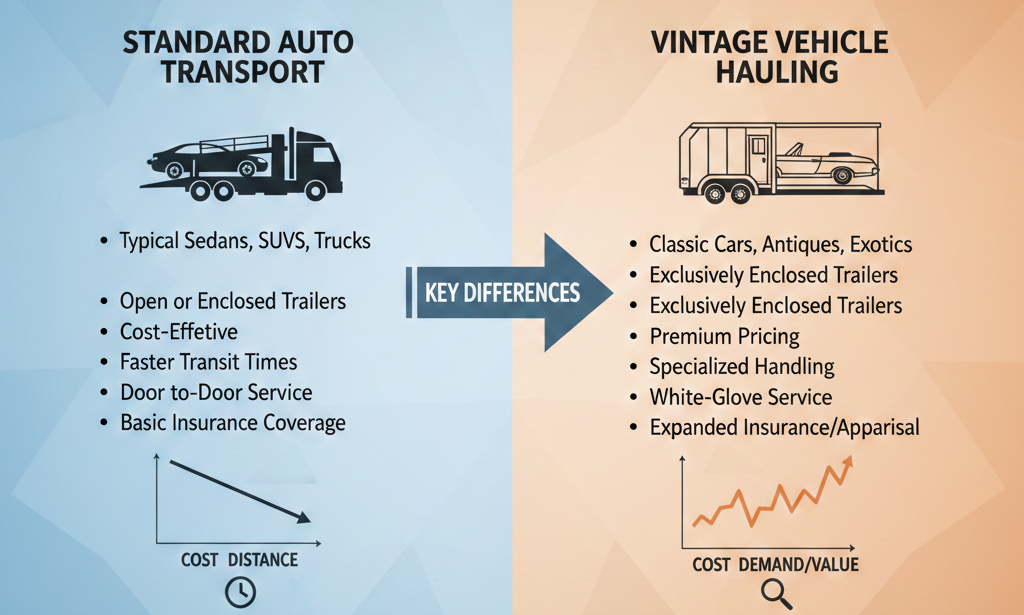
See Also: How to Haul Collectible Cars Across the States
Route Specific Insights: Dallas to Los Angeles
Spanning five states, with a distance of 1,400 miles, it is a unique classic transport route in itself. One needs to keep an eye on the tire pressure in the scorching heat of Texas. Variations in height while repositioning classic cars in New Mexico can be testing for aged braking systems. One also needs to remain alert for fluctuations in temperature from morning to afternoon in the deserts of Arizona.
“The major highway here is Interstate 40; haulers do not prefer the smaller roads that do not have adequate shoulders, as breaking down on a two-lane highway can be hazardous for something of such value.” Additionally, major highways provide easier access to emergency services in case of a need for such services.
Normally, the transport takes 5 to 7 days, with monsoon weather in Arizona adding another 2 to 3 days. Ice in the Texas Panhandle in winter can bring transport to a standstill. Spring is expected to provide the most predictable weather.
In Los Angeles, factors for delivery would include some restrictions for certain residential streets for big rigs over certain lengths. Then again, it seemed that our 9-car trailer went over some of these limits in some areas, so the drivers called ahead a day before to ensure that they could deliver in a certain spot.
What to Do If You Discover Damage After Transport
Action you should take when the car is delivered:
- Look it over to check new scratches
- Compare with the pickup photos
- Check if a fluid leaks
This should be done before you sign any Bill of Lading.
Minor damages can occur even if transported with care, as road debris can chip paint, for example, or tie-downs can damage soft rubber. Most carriers provide insurance for such damages. Damage claims should be filed within the timeframe specified in your transport agreement (generally 24-48 hours after delivery).
Pictures should be taken for comparison with pickup pics. Classic car insurance claims are not like other auto insurance claims. Components may not be available, or duplicating the original paint may not be possible. Adjusters must work with knowledgeable individuals about classic car values, or repair damage that is unique through fabrication or restoration. All forms of communication should be documented. Emailing creates a paper trail for insurance purposes.
Hopefully the 1970 Ford Galaxie XL was delivered in Los Angeles without any damage, and the spare tire also reached safely. It was important to select a trustworthy carrier in order to make the delivery process smooth or hassle-free.
Shipping Summary
Vehicle: 1970 Ford Galaxy XL Convertible
Route: Dallas, TX to Los Angeles, CA (1,400 mile)
Dallas, TX → I-20 W (Abilene → Midland/Odessa) → merge to I-10 W (Van Horn → El Paso) → continue I-10 W (Deming → Tucson → Phoenix → Blythe → Indio/Palm Springs) → I-10 W into Los Angeles, CA
Service: Open 9 Car Hauler Trailer
Cost: $519.00 ($0.38 per mile)
Season: Winter
Enclosed Transport of Street-Legal Bikes from North Miami, FL to Watertown, WI
A vivid metallic purple color, dominated the upper fairing and tail, a bright red racing contrast cut through the lower panels, the brushed aluminum mid-section, that exposes the aggressive chassis lines are what you’d expect from a proper track weapon. Carbon fiber bits are everywhere, and a blacked out SC Project exhaust system brutally screams.
Expert Notes On Bike Transport
Here are a couple of things I would like our customers to know about transporting high-performance bikes before I break this shipment into details.
This bike weighs about 440 pounds—light for a sport bike, but that lighter, narrow profile creates its own challenges. Standard wheel chocks won’t cut it, so it needs to be strapped properly at the fork tubes and rear swingarm to keep the suspension protected.
The enclosed transport quote the customer approved was $816 for the trip from North Miami, Florida to Watertown, Wisconsin (about $0.54 per mile). That price included two extra tires, 24 pounds total, at no extra charge. Serhii—the driver we’ve worked with before—called ahead to review the handling requirements and finalize the pickup details.
Why You Should Choose an Enclosed Trailer For Sport Bikes
A lot of my new customers are asking about open trailer services just because it’s cheaper, but you need to understand that you are risking your bike to weather and road debris.
Enclosed trailers have steel and aluminum walls, which is a nice guard against rain, hail, or those UV rays that tend to fade paint and strip the details on decals. A lot of them also have climate control to avoid condensation in the winter when temperatures fluctuate, and that is important if you’ve got exposed electrical bits and want to keep rust off brake rotors, chains and fasteners.
Enclosed trailers prices are about 30% to 50% more than open transport services, these numbers depend on locations area and driver availability at the moment, but before you balk at that premium, consider that just a single paint panel repair on an Aprilia RSV4 RR runs $1,500 to $3,000 at a factory-authorized shop.
The Florida to Wisconsin Route: Planning and Logistics
The pickup and final destination is around 1,400 miles and crosses six states.
Most drivers head up I-75 North in Georgia and Tennessee, switch to I-65 Kentucky and Indiana, where they make the final push into Wisconsin. Under normal conditions shipping is typically 3-5 business days and given the number of factors we cannot estimate when drivers will stop.
While the map extends along a simple east-west axis, weather now plays in as well since Wisconsin gets snow and ice while Florida remains toasty. Drivers and their dispatchers are checking the forecast, calling to pass when they will pick up with these storms. The line was best operated in the spring or autumn when it was more likely to have a period of stable weather and be not too hot, nor get below ~ 51–55°F (and much cooler at altitude) for its length.
Real-Time Updates and Communication During Transport
After the first call, the driver confirmed the pickup day and time within a couple of hours after assigning it, and the customer was notified about Serhii’s arrival time and estimated delivery day. As this is the driver’s favorite direction, the shipping process promised timely and accurate delivery estimates and active communication about any potential delays during the shipping. Serhii made sure the customer knew exactly what to expect: he confirmed with us pickup details, delivery instructions, and even asked how often the customer wanted to get updates.
Today, many carriers send text notifications at key milestones, but with our company you’ll get a text message and an email when your bike is picked up, another one when halfway to delivery, and a final confirmation before the day and on delivery day. We have drivers that provide GPS tracking links, letting you follow your motorcycle’s journey in real time or 10 minute interval updates.

Careful Unloading and Final Inspection
The drivers who do it for an extended period of time use lift gates and ramps with gentle slopes that would fit the bike’s aggressive geometry and wheel chocks are put in the right spot, and tie-down straps are released in the following manner: rear wheel first, followed by front.
Once the motorcycle is properly secured, an examination becomes necessary. Photographs and videos are then done to “Bill of Leading”(BOL) it as a formality. It represents an examination done at an equal level as before it was shipped from Miami.
Due to the covering that was put on before shipping, all of the panels made out of carbon fibers, as well as all the components and painted surfaces, were shipped without any scratch. Not only that, but with the enclosed trailer, there was no chance for dirt, debris, or any elements at all to make contact with the bike. By the time it reached Wisconsin, the RSV4 RR looked as if it had never left the state of Florida.
Transport Summary
Vehicle: 2023 Aprilia RSV4 RRs
Route: North Miami, FL to Watertown, WI (1,514 mile)
I-75 or I-95 North → I-24 or I-65 through GA/TN/KY → I-57 or I-94 through IL → I-94 or I-41 into Wisconsin
Service: Hard Side Specialized Enclosed Trailer
Cost: $816.00 ($0.54 per mile)
Season: Autumn
2-Day Auto Transport: 2019 Lexus RX 350 Delivered from Columbus, OH to Dallas, TX in Record Time
On December 8th, a customer booked auto transport services for their 2019 Lexus RX 350 from Columbus, Ohio, to Dallas, Texas. The next day, a transport service was assigned, and the pick-up took place. By December 10, the 2019 Lexus RX 350 had arrived at Dallas, thereby indicating that with proper planning and organization, expedited auto transport services can be very successful.
The Complete Timeline
Day 1 (Sunday, December 9): Immediately after loading, it departed in the afternoon with an approximate distance of 600-700 miles. It traveled smoothly via I-70 W and entered Missouri after Illinois and Indiana. By late evening, it passed St. Lucie.
Day 2 Monday, December 10
The driver began early and took the rest of the drive. The journey took them through Oklahoma and then into Texas on I-40 and I-35. From Columbus to Dallas, it is approximately 1,075 miles. The driver then telephoned the customer on December 10, in the morning, to confirm an ETA at midday.
December 10 – All Done
The driver reached Dallas on time. The driver made use of the ramps to get the Lexus from the truck. The customer met the driver on arrival.
The customer and driver inspected the car together. The customer and driver made sure that there were no clashes as it transported.
Good news: the car looked perfect.
Both parties signed the Bill of Lading, stating that everything went well, and the car was in excellent condition. The driver handed them the keys and ensured that the engine started properly. It took no more than 20 minutes. The Lexus RX 350 drove 1,075 miles without an issue, arriving a day before most deliveries, and it cost exactly what we paid at booking.
Several factors made it easy to have a smooth shipping experience
- Big Cities: Both Columbus and Dallas have an enormous amount of truck traffic. Having truck traffic as an advantage, it becomes easy to locate carriers and transport cars.
- Early December Timing: December can be pretty nuts, but it’s still doable early on. It’s easier on your pocket and your planning schedule before it gets crazy at the end of the month.
- Vehicle Condition: The Lexus was in working condition and drove right onto the trailer. But if it’s not working properly, they have to winch it on. That might be an added cost and make it an even longer wait for a pickup.
- Good Communication: There was no delay because of good communication among the customer, broker, and carrier. All parties knew what was going on and when.
- The Direct Route: It didn’t have to make a whole list of stops on its journey. Just a single pick-up and a single delivery. That cuts a whole big amount of time from its travel.
- No Weather Worries: December weather can be very unpredictable. But as it turned out, we were treated with perfect running conditions. No snow, no ice, no postponements.
- Standard Vehicle: The size of the Lexus RX 350 SUV is normal. There isn’t any special equipment required. It doesn’t need large permits. It will fit perfectly on any trailer.
What Made This Fast
Columbus to Dallas is about 1,075 miles. Most shipments on this route take 3-5 days from booking to delivery. This one took two. Timing and availability were the only differences. It just happened that the carrier was already in the direction of the customer and had space. The customer wanted to go, the weather cooperated, and everything just clicked into place.
The Customer Review
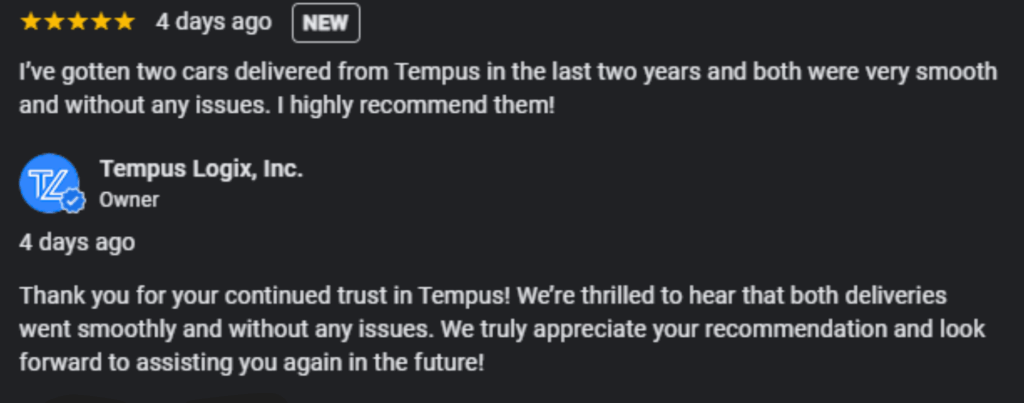
It has a rating of 4.9 stars on Google with more than 2,025 reviews from verified customers.
The transport from Columbus to Dallas lived up to what customers have been saying all along: communicate with them, don’t surprise them, and the car will arrive at the agreed-upon time. It’s a relatively
Shipping Summary
Vehicle: 2019 Lexus RX 350
Route: Columbus, OH 43229 to Dallas, TX 75218 (1,075 miles)
I-70 W – I-35 S
Service: Open trailer for 7 vehicles
Cost: $800 ($0.75 per mile)
Season: Winter
A Suzuki GSX-R’s Journey: From Backroads, LA to Desert, AZ
The client required a 2011 Suzuki GSX-R600 be delivered from Ponchatoula, Louisiana to Somerton, Arizona. He wanted it there quickly, he wanted it done right, and he wanted it for a reasonable price.
Here’s precisely what happened.
The Timeline
November 9: A customer contacted us to ship his motorcycle.
November 12: This is the earliest available date. From the initial inquiry, we had been able to assign a carrier for delivery in three days.
November 15: Driver took the motorcycle from Ponchatoula, loaded it into an enclosed trailer, and headed west.
November 17: Motorcycle delivered to Somerton, Arizona. Two-day transit in three states.
From booking through to carrier assignment: 3 days.
Pickup to delivery: 2 days.
Total Distance: about 1,600 miles.
Importance of Enclosed Transport

The motorcycles we are shipping are only with an enclosed trailer. This was a better choice, but considering the route it would be taking, Louisiana to Texas and then Arizona, it was good.
Rain in East Texas, dust storms in West Texas, and cooling in New Mexico are the conditions to be expected for this trip in mid-November. An open carrier leaves bicycles unprotected to all of this. The dust can get into chains, brake calipers, and even under fairings. Water from rain may present a problem if it gets into certain places.
With enclosed transport, it is protected from the beginning of the transport until it is delivered. The GSX-R arrived clean, dry, and undamaged. That’s what we are expecting from enclosed transport.
The Execution
The driver handled this professionally. There were no delays at pickup. There was no breakdown in communications on the route. The delivery was completed in a timely fashion, and safety was maintained.
Two days is quite fast to cover this distance, which can be termed as a transport period. Cross-country deliveries of motorbikes take about three to five days on average, depending on the available routes. This was done within two days, meaning this shipment was a priority one.
The customer pointed out that this bike came “clean, dry, and with no damages whatsoever.”
That’s what careful loading, transportation, and unloading do.
What the Customer Paid
He found the price very affordable, he commented.
Enclosed motorcycle transport generally runs more expensive than open transport. This is exactly what you are paying for: specialized equipment and scarcity. A move from Louisiana to Arizona is normally in the range of $600 to $1,200.
“It means that affordable pricing does not necessarily mean cheap. It means that the price reflected the value received.” The customer received speedy delivery, protection, professional handling, and no damage. That costs money.
We quoted it to him from the beginning, nothing extra, no surprise charges down the line; he paid what we quoted.
The Customer Review
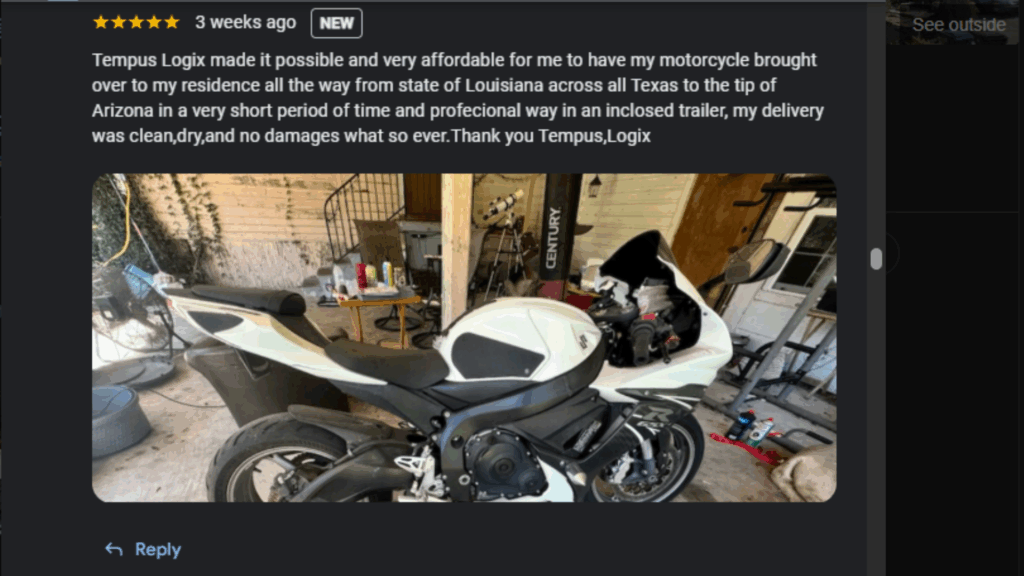
Everything went like clockwork! Not a hitch in sight, and their bike arrived in the same condition that it was in when it was collected; couldn’t be happier!
What Made this Work
- Quick carrier assignment: We had a driver locked in within three days of inquiry. We did not sit on the booking.
- Reliable carrier: Did not experience random cross-country delivery in two days. Carrier knew the territory and delivered as scheduled.
- Proper equipment: The motorcycle was covered with an enclosed trailer protecting it from environmental and road hazards for 1,600 miles.
- Professional delivery: A clean delivery with no signs of damage means the driver has delivered the motorcycle properly.
- Transparent prices, which were ideal for the customer to feel he received value for money.
- The implications this has for motorbike transport.
What This Means for Motorcycle Shipping
- Early booking: We could do with a lot of speed, but at times when busy might not be possible.
- Sportbikes should be transported with an enclosed trailer: The motorcycles sit low to the ground, sport high-dollar fairings, and are not designed to handle road debris at highway speeds. Expensive, but well worth your money.
- Check insurance coverage: Make sure you know what you are covered for before loading your bike.
- Be available: If there’s a change in pickup timing or an update in the delivery window, this ensures it all goes according to plan.
- Use a company with pre-set carrier relationships: Assignments are fast, and executions go through seamlessly because of the use of carriers who know their job.
Shipping Summary
Vehicle: 2011 Suzuki GSX-R600
Route: Ponchatoula, LA, 70454 to Somerton, AZ, 85350 (1625 miles)
I-55 N- I-40 W- I-10 W- US-95 S
Service: Hard-side enclosed trailer for 3 vehicles
Cost: $1100 ($0.68 per mile)
Season: Autumn
6-Day Auto Transport: 2023 GMC Yukon XL Shipping from Austin,TX to Millburn, NJ
The 2023 GMC Yukon XL is a large SUV, one of the biggest you can find in the US. It’s more than 18 feet long and weighs around 5,700 pounds. It has three rows of seats and tons of room for cargo. Even though it’s so big, getting it shipped from Austin to New Jersey wasn’t too hard. That’s because both cities are on major highways with lots of transport trucks, so it’s easier to find someone to move it than if it were going somewhere out in the boonies.
The Complete Timeline
On November 25th, the customer booked the transportation.
The customer used the online quote system, entering her car’s info, pickup in Austin, drop off in Millburn, and when she wanted it done. Pretty quick, she got a quote that spelled out the costs and how long it should take.
Our company assigned a carrier the same day. The Austin to New Jersey route is a busy one, so it’s usually easier to find carriers than for routes to more out-of-the-way spots. Since it was November, carriers weren’t as busy as during the summer moving rush. The carrier used a normal two-deck open hauler. It can carry 7-10 cars. They were already sending other cars toward the Northeast, so picking up Sarah’s in Austin made sense for them.
Once we assigned a carrier, we contacted the customer, and she got the driver’s contact info. Both of us contacted the customer on November 26th to double-check the address and figure out when to come. They settled on a pickup time for Thursday, November 28th.
November 28th – Getting the Car Picked UpAfter booking, the driver showed up in Austin to pick up the Yukon XL. The pickup went pretty smoothly.
First, the driver and the customer checked out the Yukon together, making notes on its condition. The customer also snapped a bunch of photos from all sides to show what the car looked like before it was loaded. The whole process took about 25-30 minutes.
Nov 28th – Dec 4th – On the RoadAfter it was loaded up, the Yukon XL started the trip to New Jersey.
Day 1 (Thursday, Nov 28th): Right after it was loaded and all the paperwork was done, the truck left Austin in the early afternoon. It went about 200-300 miles, ending up in eastern Texas or western Louisiana by evening. Truck drivers can only drive for 11 hours after taking 10 hours off.
Days 2-3 (Weekend, Nov 30th – Dec 1st): The car stayed put on the trailer while the driver took the weekend off. The truck was kept in a safe place while the driver had to take time off. Lots of drivers who work five days a week do this.
Day 4 (Monday, Dec 2nd): The trip began again, and the truck went about 450 miles through Arkansas and Tennessee. The driver made good time on Interstate 40, which is the road most trucks use to go from Texas to the Northeast.
Day 5 (Tuesday, Dec 3rd): Another full day of driving, covering 450 miles through Virginia and into the mid-Atlantic area. The route kept going on I-81 North through Virginia. The driver stuck to their plan since there was no bad weather or truck problems.
The driver called the customer on Dec 3rd to check when and where to drop off the car the next day. They thought they’d be there between 10 AM and 2 PM on Dec 4th. The driver double-checked the address and made sure they could get to it. Day 6 (Wednesday, Dec 4th): On the last day, the truck finished the trip into New Jersey and got to the place in Millburn.
December 4th – All Done!
The driver arrived in Millburn within the scheduled time. The driver used the ramps to get the Yukon XL off the truck. The customer was there to meet the driver.
The customer and the driver checked out the car together. They made sure nothing got dinged up while it was being shipped.
Good news: the car looked perfect.
They both signed the BOL to say everything went well, and the car was in good shape. The driver handed over the keys and made sure the car started up fine. The whole thing took about half an hour.
GMC Yukon XL traveled 1,712 miles safely, arrived on time, and cost exactly what was quoted at booking.
Several elements contributed to this smooth shipping experience
1. Big Cities: We ship a lot to Austin and NYC. Because of this, it’s easier to find carriers and get good prices.
2. Fall Timing: November is a slow time for moving. Prices jump in the summer by 10-15% because of college students, families moving, and vacationers.
3. Vehicle Condition: The Yukon XL was running fine, so it drove right onto the trailer. If a car doesn’t run, we must winch it on. That can add \$200-\$500 to the price and make pickup take longer.
4. Good Communication: Good communication between the customer, broker, and carrier prevented delays. Each of them understood the responsibilities and met the commitments.
5. Realistic Schedule: Knowing that carriers only work on weekdays helped us to give a realistic delivery date. 6. The Paperwork: We took photos during inspection and had a detailed Bill of Lading. This protected everyone because it showed exactly what condition the car was in before shipping.
Shipping Summary
Vehicle: 2023 GMC Yukon XL
Route: Austin, TX 78728 to Millburn, NJ 07041 (1712 miles)
I-35 N – I-30 E / I-40 E – I-81 N – I-78 E / I-287 N
Service: open trailer for 7 cars
Cost: $1200 ($0.70 per mile)
Season: Autumn-Winter
Ford Focus Car Transport: Moss Point, MS to Sierra Vista, AZ
When Ambrouse Hyde needed to move his 2003 Ford Focus sedan from Moss Point, Mississippi to Sierra Vista, Arizona, he wasn’t sure what to expect from the car shipping process. After all, moving a vehicle across 1,500 miles involves trusting strangers with one of your most valuable possessions.
But after his car arrived safely in Arizona, Hyde didn’t hesitate to share his thoughts.

That kind of feedback doesn’t come from just getting a car from Point A to Point B. It comes from a company that treats customers like people, not just transaction numbers.
Regional B2B Car Shipping: Mississippi to Arizona Routes
This route from Moss Point, MS to Sierra Vista, AZ isn’t one of the busy routes that see a lot of traffic from California to Texas. This route would be classified under a regional B2B route. The carriers that transnational corporations would need to carry their vehicles to their destinations would have to be familiar with the route.
Moss Point hugs the Gulf of Mexico coastline just outside of Pascagoula. Sierra Vista is nestled in the southeastern edge of Arizona. Connecting the two locations takes you through the states of Louisiana, Texas, New Mexico, and then Arizona. That covers a whole lot of mileage, and not all the carriers choose to fly between places that aren’t the interstate highways.
The thing about this route that makes it a challenge: Moss Point isn’t a big metro. Nor is the next stop, Sierra Vista. A smaller route also tends to have less frequent passing-through traffic. This can result in longer wait times for pickup if your broker isn’t particularly well-versed in connecting you to a quality carrier.
Tempuslogix deals with these less frequent routes all the time. We pair the customer with a transporter who is already going there. This reduces the delay in the route and also keeps the charges affordable.
See Also: Mississippi to Arizona Car Shipping
Transit Times for Moss Point, MS to Sierra Vista, AZ Commercial Shipments
The Timing: When shipping a car across the country, you want to have a real sense of when it’s going to arrive. For a route like Moss Point to Sierra Vista, transit typically fits within the 5-8-day window, assuming no big snags in weather or road conditions.
The trip covers about 1,500 miles, though the exact distance depends on the carrier’s chosen route. Most drivers will route through Houston, then west through Texas and New Mexico before dipping into Arizona. It’s a clear path, just a long one. And because drivers can only log so many hours each day under federal rules, the journey gets split into several days.
If you’re booking during peak seasons-summer or the holidays-plan on the longer end of that window. In off-peak times such as late winter or early spring, you may experience faster delivery.
Clear communication was a key factor in Hyde’s shipment going smoothly. Our team kept him posted on pickup and delivery windows so there was no guesswork. That’s just how we operate. Nobody likes crickets when a car is somewhere between Mississippi and Arizona.
9 Car Hauler Transport: Cost-Effective Solutions for Business Fleets
Hyde’s Ford Focus didn’t travel alone. It was loaded onto a 9-car hauler, which is one of the most common types of transport trucks in the industry. These haulers carry anywhere from 7 to 10 vehicles at a time, stacking them on two levels to maximize space.
Why does this matter? Because it’s the most cost-effective way to ship a car. The carrier is moving multiple vehicles at once, which spreads fuel costs and driver time across several customers. That’s how open transport stays affordable compared to enclosed trailers or single-car flatbeds.

For businesses managing fleets, 9-car haulers are the standard. Dealerships use them to move inventory between locations. Auction houses rely on them to transport vehicles to and from sales. Leasing companies use them to relocate cars when leases end. It’s efficient, reliable, and doesn’t require the premium pricing of enclosed transport. Hyde’s Focus was secured with soft tie-down straps, which protect the wheels and prevent any shifting during transit. The carrier did a walk-around inspection before loading and again at delivery. That’s part of the process—documenting the condition so everyone’s on the same page.
Every Customer’s Feedback Matters
A review such as Hyde’s isn’t just a pleasant compliment, it is a representation of what we care about deeply: doing the right thing for people. It is anything but fun to haul a car across the country. Not only do you lend them the keys to a vehicle that is important to you and trust them to arrive intact on the other end.
We kept contact with them throughout. When the carrier made the pickup, Hyde was aware. He was informed about the movement status when the car was on its way. He was alerted when delivery was imminent. It does not take much to exceed customer service—just doing the task is sufficient.
What This Route Taught Us
Every shipment teaches us something. The Moss Point to Sierra Vista route reminded us that not everyone ships cars on major highways. Some customers are in smaller towns, and they need the same level of service as someone in Los Angeles or Miami.
It also confirmed what we already knew: open transport on 9-car haulers works. It’s affordable, efficient, and gets the job done. Enclosed transport has its place, especially for high-value vehicles, but for a 2003 Ford Focus? Open transport made perfect sense. The other takeaway? Communication wins. Hyde didn’t leave that review because we did something extraordinary. He left it because we did what we said we’d do, kept him informed, and didn’t make him chase us down for updates. That’s what customers want. It’s not complicated.
Shipping Summary
Vehicle: 2003 Ford Focus Sedan
Route: Moss Point, MS to Sierra Vista, AZ (~1,500 miles)
Moss Point, MS → take I-10 W through Louisiana → Texas → New Mexico → into Arizona → exit at Benson → take AZ-90 S → continue straight into Sierra Vista, AZ
Service: Open 9 Car Hauler
Season: Winter
Car Shipping Christmas 2026 Discount at Tempus Logix (Code: XMAS7)
The holidays should be restful. 20+ hours spent driving does not have that description. For these holidays, Tempus Logix is offering a better option. Use code XMAS7 to save 7% on your car shipping.
Forget about the stressful drive. Let us handle the logistics while you hold the eggnog.
Who needs car shipping on Christmas?
1. Snowbirds traveling between seasonal homes
2. College students heading home for break
3. Military families on holiday leave
4. Professionals relocating for January job starts
5. Car collectors attending winter auctions
6. Families avoiding long winter drives
7. Retirees moving to warmer climates
8. Online car buyers purchasing vehicles out of state
How the holiday discount works
Getting your 7% discount takes a few minutes.
1. Use our calculator to see the real price for your route.
2. After we receive your book and contact you, you will use the promo code XMAS7 to obtain your discount.
3. We will assign a carrier for your shipment and send the driver’s details with pickup and drop-off days and times.
That’s it. It’s a simple process because we have been doing this for 7+ years.
Heads up: Book by December 15 to make sure you get your delivery before Christmas. After that, we can’t promise it’ll get there before the holidays.
Get your 7% discount today
The holidays are coming up fast, so book your car shipping soon!
Use code XMAS7 to save 7% on Christmas transport. Get a quick quote now while there are still carriers open.
Got questions? Call us at 818-804-4041. Our team is here to help you plan your holiday shipping seven days a week.
This Christmas, spend your time with family and let us move your car.


